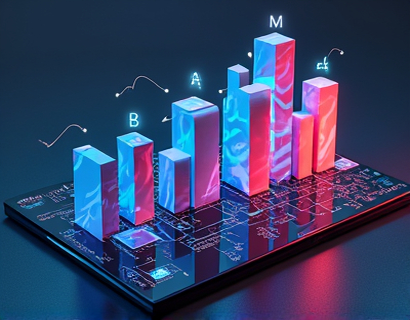Blockchain-Powered Data Partitioning: Revolutionizing Privacy and Efficiency for Businesses and Privacy-Focused Users
In an era where data breaches and privacy concerns are rampant, the need for robust and secure data management solutions has never been more critical. Traditional data management systems often fall short in providing the necessary level of privacy and efficiency, especially for businesses handling sensitive information and privacy-conscious individuals. This is where blockchain-powered data partitioning emerges as a transformative technology, offering a new paradigm for data management. By leveraging the inherent properties of blockchain, such as decentralization, immutability, and transparency, this technology ensures that sensitive data is managed with unprecedented security and efficiency.
Data partitioning, in essence, involves dividing data into smaller, manageable segments or partitions. When combined with blockchain technology, this process becomes not only more secure but also highly efficient. Blockchain's decentralized nature means that data is not stored in a single location but is distributed across a network of nodes. This distribution inherently reduces the risk of a single point of failure and makes it extremely difficult for unauthorized parties to access or manipulate the data.
Enhanced Security Through Decentralization
The decentralized architecture of blockchain is one of its most significant advantages when it comes to data privacy. Unlike traditional centralized databases, where a breach can expose all data, blockchain's distributed ledger ensures that even if one node is compromised, the entire dataset remains secure. Each partition of data is encrypted and linked to the previous one through cryptographic hashes, forming a chain that is nearly impossible to alter without detection. This makes blockchain an ideal solution for businesses dealing with highly sensitive information such as financial records, personal identification data, and confidential business documents.
Moreover, the use of advanced cryptographic techniques ensures that data remains confidential and accessible only to authorized parties. Access control mechanisms can be implemented at the partition level, allowing organizations to define precisely who can view or modify specific segments of data. This granular control over data access is a significant improvement over traditional systems, where broad access permissions often lead to unnecessary exposure of sensitive information.
Improved Efficiency and Scalability
Beyond security, blockchain-powered data partitioning also offers substantial improvements in operational efficiency and scalability. Traditional data management systems can become bottlenecks as data volumes grow, leading to slower performance and increased costs. Blockchain's distributed nature, however, allows for parallel processing of data partitions, significantly enhancing performance. Each node in the network can handle a portion of the data independently, reducing the load on any single node and enabling faster data processing and retrieval.
Scalability is another key benefit. As businesses grow and their data needs expand, blockchain-based systems can easily accommodate increased data volumes by adding more nodes to the network. This horizontal scalability ensures that the system can handle growing data demands without compromising on performance or security. In contrast, traditional systems often require expensive upgrades and infrastructure changes to scale, which can be both time-consuming and costly.
Use Cases in Various Industries
The applications of blockchain-powered data partitioning are vast and varied, spanning multiple industries where data privacy and efficiency are paramount. In the financial sector, for instance, banks and financial institutions can use this technology to securely share transaction data while maintaining compliance with stringent regulatory requirements. The immutable nature of blockchain ensures that transaction records cannot be tampered with, providing a high level of trust and transparency.
In the healthcare industry, patient data is highly sensitive and requires robust protection. Blockchain-based data partitioning can enable hospitals and healthcare providers to share patient records securely, ensuring that only authorized personnel have access to specific information. This not only enhances patient privacy but also improves the efficiency of healthcare delivery by facilitating seamless information exchange between different providers.
The legal sector also stands to benefit significantly. Legal documents and evidence often need to be shared between multiple parties while maintaining their integrity and confidentiality. Blockchain-powered data partitioning can provide a secure and transparent way to manage these documents, ensuring that each party has access only to the information relevant to them and that the data remains unaltered.
Challenges and Considerations
While the benefits of blockchain-powered data partitioning are clear, there are also challenges and considerations that organizations must address. One of the primary concerns is the complexity of implementing such a system. Blockchain technology is still relatively new, and integrating it with existing data management infrastructure can be a complex task. Organizations need to invest in skilled personnel or partner with experts who can guide them through the implementation process.
Another consideration is the issue of interoperability. Different blockchain platforms may have varying protocols and standards, which can make it challenging to ensure seamless data sharing across different systems. However, the development of cross-chain solutions and standards is an active area of research, and progress is being made to address these interoperability challenges.
Performance is another factor to consider. While blockchain offers significant security and efficiency benefits, the process of consensus and block creation can introduce latency. For applications requiring real-time data processing, this latency might be a concern. However, advancements in blockchain technology, such as the use of permissioned blockchains and optimized consensus algorithms, are helping to mitigate these performance issues.
Future Trends and Innovations
The future of blockchain-powered data partitioning is promising, with ongoing innovations set to further enhance its capabilities. One area of focus is the development of more efficient consensus mechanisms that can reduce latency and increase transaction throughput. For example, proof-of-stake (PoS) and delegated proof-of-stake (DPoS) are gaining traction as more energy-efficient alternatives to traditional proof-of-work (PoW) mechanisms.
Another exciting development is the integration of blockchain with other emerging technologies such as the Internet of Things (IoT) and artificial intelligence (AI). IoT devices generate vast amounts of data that need to be managed securely and efficiently. Blockchain can provide a decentralized and secure platform for data storage and sharing, ensuring that IoT data is protected from tampering and unauthorized access. AI can further enhance data management by automating the analysis and decision-making processes based on the data stored in blockchain partitions.
Privacy-enhancing technologies, such as zero-knowledge proofs, are also being integrated into blockchain systems to allow for verifiable computations without revealing sensitive data. This means that parties can confirm the validity of certain data without exposing the actual data itself, adding an extra layer of privacy and security.
Conclusion
Blockchain-powered data partitioning represents a significant leap forward in data management, offering unparalleled levels of privacy, security, and efficiency. By leveraging the decentralized and immutable nature of blockchain, organizations can ensure that their sensitive data is managed in a way that meets the highest standards of protection. As the technology continues to evolve and mature, its adoption across various industries is likely to grow, transforming the way businesses and privacy-conscious individuals handle their data. Embracing this innovative approach can provide a competitive edge and ensure long-term data integrity and trust.









































